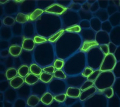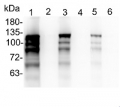Hordeum vulgareBelow you will find antibodies with confirmed or predicted reactivity to Hordeum vulgare Protocols and Technical Information • Support • Western Blot Video Tutorials |  |

AS22 4787 | Clonality: Polyclonal | Host: Rabbit | Reactivity: Arabidopsis thaliana, Horderum vulgare, Lycopersicum esculentum, Nicotiana benthamiana, Oryza sativa
This product is a replacement of AS15 3076

AS22 4711 | Clonality: Polyclonal | Host: Rabbit | Reactivity: Arabidopsis thaliana, Synechocystis sp. , Synechococcus sp., Cyanobacterium aponinum, Chlorogloeopsis sp.

AS07 212B | Clonality: Polyclonal | Host: Rabbit | Reactivity: A.thaliana, di and monocots | Cellular [compartment marker] of mitochondrial outer membrane

AS03 035B | Clonality: Polyclonal | Host: Rabbit | Reactivity: [global antibody] for di and monocots | Cellular [compartment marker] of cytoplasm for photosynthetic tissues.
Benefits of using this antibody

AS05 084B | Clonality: Polyclonal | Host: Rabbit | Reactivity: [global antibody] for higher plants, algae, liverwort, cyanobacteria, diatoms
compartment marker of thylakoid membrane
Benefits of using this antibody

AS07 257B | Clonality: Polyclonal | Host: Rabbit | Reactivity: A. thaliana, H. vulgare, Z. mays, cyanobacteria, diatoms
compartment marker of chloroplast stroma

AS09 487B | Clonality: Polyclonal | Host: Rabbit | Reactivity: A. thaliana, J. curcas, P. nigra, P. trichocarpa, R. sativus

AS09 458B | Clonality: Polyclonal | Host: Rabbit | Reactivity:A. comosus, A. thaliana, S. PCC 6803, Ch. velia, H. vulgare, J. curcas, Lupinus sp. , M. crystallinum, N. tabacum, O. sativa, Saccharum spp. hybrid clone C91-301, S. laricifolia, Z. mays, Synechocystis sp. , P. tricornutum (strain CCAP 1055/1), T. weissfloggi
Benefits of using this antibody

AS10 710B | Clonality: Polyclonal | Host: Rabbit | Reactivity: A. thaliana, S. lycopersicum, V. faba, P. patens, S. europaea, Z. mays, Ch. reinhardtii | cellular [compartment marker] of nucleoplasm

AS09 481B | Clonality: Polyclonal | Host: Rabbit | Reactivity: A. thaliana, B. napus, C. sativus, R. sativa L. Tokinashi-daikon, S. oleracea, S. lycopersicum, S. tuberosum, T. aestivum, Z. mays, O. europaea, P. abies, P. patens, Ch. reinhardtii

AS09 481-ALP | Clonality: Polyclonal | Host: Rabbit | Reactivity: A. thaliana, B. napus, C. sativus, R. sativa L. Tokinashi-daikon, S. oleracea, S. lycopersicum, S. tuberosum, T. aestivum, Z. mays, O. europaea, P. abies, P. patens, Ch. reinhardtii

From the laboratory of Paul Knox, Phd, University of Leeds, United Kingdom

From the laboratory of Paul Knox, Phd, University of Leeds, United Kingdom

AS21 4615 | Clonality: Monoclonal | Host: Mouse recombinant antibody (animal-free technology) | Reactivity: Arabidopsis thaliana, Eschscholzia californica, Medicago sativa, Nicotiana benthamiana, Nicotiana tabacum, Salvia plebeian, Zea mays
This product replaces AS16 4111

From the laboratory of Paul Knox, Phd, University of Leeds, United Kingdom

From the laboratory of Paul Knox, Phd, University of Leeds, United Kingdom

From the laboratory of Paul Knox, Phd, University of Leeds, United Kingdom

From the laboratory of Paul Knox, Phd, University of Leeds, United Kingdom

From the laboratory of Paul Knox, Phd, University of Leeds, United Kingdom

From the laboratory of Paul Knox, Phd, University of Leeds, United Kingdom

From the laboratory of Paul Knox, Phd, University of Leeds, United Kingdom

From the laboratory of Paul Knox, Phd, University of Leeds, United Kingdom

From the laboratory of Paul Knox, Phd, University of Leeds, United Kingdom

From the laboratory of Paul Knox, Phd, University of Leeds, United Kingdom

From the laboratory of Paul Knox, Phd, University of Leeds, United Kingdom

From the laboratory of Paul Knox, Phd, University of Leeds, United Kingdom




